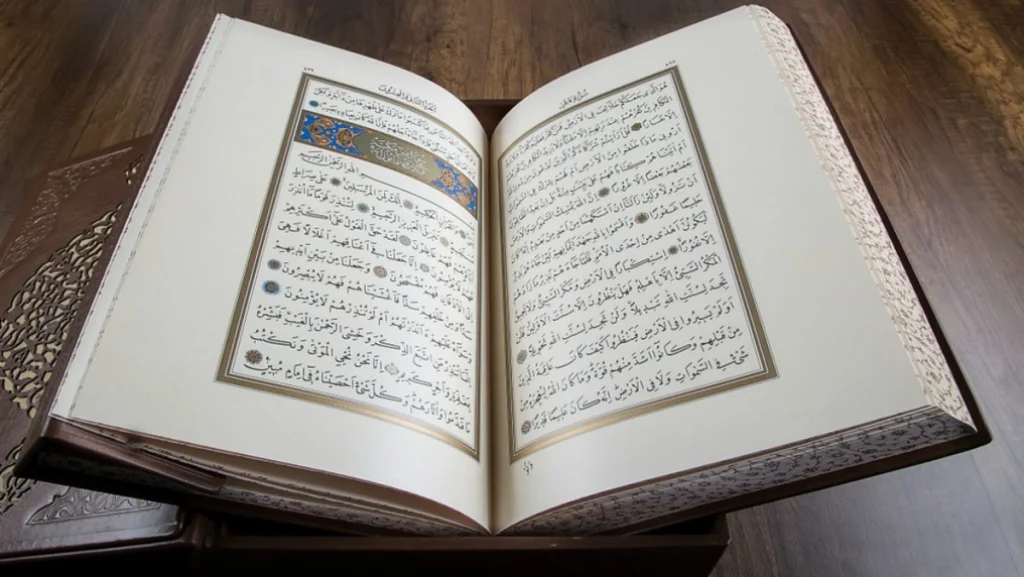Abraham stands as a towering figure in the spiritual landscapes of Judaism, Christianity, and Islam. Known as the “Father of Faith” in each of these religions, Abraham’s journey exemplifies unwavering devotion, obedience, and profound faith in a monotheistic God.
His legacy has shaped millennia of religious tradition, influencing theological frameworks, rituals, and ethical systems. Despite theological divergences, Abraham’s story is a shared narrative that continues to inspire and connect these three distinct faith communities.
This article examines Abraham’s multifaceted legacy within each religion, exploring both shared themes and unique perspectives, with a view to understanding how his story serves as a source of spiritual guidance, moral teachings, and interfaith dialogue.
Abraham in Judaism: A Foundation of Covenant and Faith
In Jewish tradition, Abraham is a central figure and often called the first patriarch, whose life and covenant with God form the foundation of Jewish identity, religious beliefs, and practices.
Known in Hebrew as Avraham, he is revered not only as a spiritual ancestor but as the very embodiment of faith, obedience, and righteousness. His story, primarily recounted in the Book of Genesis, is marked by profound encounters with God and pivotal tests of faith that shape the Jewish understanding of covenant and communal responsibility.
This examination of Abraham’s role in Judaism will delve into his covenant with God, the binding of Isaac, and the ongoing symbolic significance of Abraham’s actions and attributes, which continue to influence Jewish practices, beliefs, and identity.
The Covenant with God: A Foundational Pact
Abraham’s covenant with God is perhaps the most significant aspect of his legacy in Judaism. According to Genesis 12:1-3, God calls Abraham (then known as Abram) to leave his homeland, promising that he will be blessed with a great nation and that through him, all families on earth will find blessing.
This call represents the beginning of a special relationship between God and Abraham, which is further developed and formalized in Genesis 15 and 17.
Here, God promises Abraham that his descendants will be as numerous as the stars and that they will inherit the land of Canaan. This divine promise of land and descendants is critical, as it establishes the Jewish people as a distinct group with a unique mission and relationship with God.
In Genesis 17, the covenant becomes a binding pact with a physical sign.
God instructs Abraham to circumcise himself and every male in his household as a mark of this covenant, saying, “This is My covenant, which you shall keep, between Me and you and your offspring after you: every male among you shall be circumcised” (Genesis 17:10, NRSV).
This act, known as Brit Milah, becomes a foundational ritual in Jewish life, representing not only the continuation of Abraham’s covenant with God but also a commitment to obey divine commandments. Circumcision is performed on Jewish boys at eight days old, symbolizing entry into the Jewish community and a commitment to the covenant established by Abraham.
This covenantal ritual has persisted for millennia and remains a defining practice in Judaism, serving as both a spiritual and cultural link to Abraham’s original agreement with God.
Abraham as a Model of Faith and Obedience
Another essential aspect of Abraham’s legacy in Judaism is his role as a model of unwavering faith and obedience. The story of the Akedah, or the Binding of Isaac, is perhaps the most poignant example of Abraham’s profound faith in God. In Genesis 22, God commands Abraham to take his son Isaac to the land of Moriah and offer him as a sacrifice.
Despite the unimaginable nature of this command, Abraham proceeds without hesitation. This story is often viewed as the ultimate test of faith, with Abraham demonstrating total obedience to God’s will, even when it requires tremendous personal sacrifice. However, just as Abraham is about to carry out the sacrifice, God intervenes, providing a ram as a substitute.
This act symbolizes God’s mercy and reiterates that the covenant will continue through Isaac.
Jewish interpretations of the Binding of Isaac are varied but generally view Abraham’s actions as the pinnacle of faithfulness. The Akedah is particularly significant in Jewish liturgy and theology, especially during Rosh Hashanah, the Jewish New Year.
The shofar, or ram’s horn, blown during Rosh Hashanah services, recalls the ram that replaced Isaac on the altar.
The sound of the shofar symbolizes both a call to repentance and a reminder of the covenantal promise, commemorating Abraham’s willingness to obey God at all costs and renewing Jewish dedication to living according to divine commandments.
Rabbinic literature and later Jewish commentators have explored Abraham’s faith and tested nature, often presenting him as a figure who embodies emunah (faith) and hesed (loving-kindness).
The Talmud, a foundational text of Rabbinic Judaism, provides various interpretations that emphasize Abraham’s piety and courage. For instance, it recounts how Abraham broke away from the idolatrous practices of his father’s house and sought out a monotheistic understanding of God (Genesis Rabbah 38:13).
According to these interpretations, Abraham’s search for the one true God and his rejection of polytheism make him a model of righteousness, establishing the monotheistic foundation that Judaism would uphold throughout history.
Abraham’s Symbolic Legacy in Jewish Thought and Practice
In Jewish thought, Abraham represents much more than an ancestor; he symbolizes a commitment to faith, justice, and ethical behavior.
Throughout history, Jewish sages and scholars have pointed to Abraham’s acts of kindness and hospitality as exemplars for Jewish conduct. In Genesis 18, Abraham welcomes three strangers into his tent, providing them with food, water, and shelter.
This act of generosity and hospitality is viewed as an essential Jewish value, with the concept of hachnasat orchim (welcoming guests) deriving from Abraham’s example. Jewish communities across the world regard hospitality as a core ethical obligation, linking it back to Abraham’s legacy.
The covenantal relationship established through Abraham also emphasizes communal responsibility and moral conduct, shaping Jewish views on justice and charity. The prophet Isaiah, for instance, calls the descendants of Abraham to “establish justice in the gate” (Isaiah 29:22-23).
This connection to Abraham underscores the Jewish principle of tzedakah (charitable giving) and the broader duty to uphold social justice within and beyond the Jewish community.
By tracing these values back to Abraham, Jewish tradition highlights the enduring relevance of Abraham’s faith and ethics in guiding Jewish life and responsibilities.

Abraham in Christianity: A Model of Faith and Spiritual Heritage
In Christianity, Abraham is celebrated as a pivotal figure who exemplifies faith and trust in God. Christians regard Abraham as a “father in faith” whose relationship with God laid the groundwork for understanding divine promises, righteousness, and covenantal blessings.
The story of Abraham in Christian scripture, particularly in the New Testament, portrays him as a model of belief and obedience, whose faith becomes the archetype for salvation through faith. The influence of Abraham extends beyond his life story, contributing to Christian theological frameworks, especially concerning the doctrines of grace, faith, and the promise of salvation. This exploration of Abraham’s role in Christianity will examine the significance of Abraham’s faith, his role as a spiritual ancestor to Christians, and the broader implications of his covenant with God.
Abraham’s Faith as a Model in the New Testament
In the New Testament, the Apostle Paul presents Abraham’s faith as the standard of true belief, defining Christian righteousness as rooted in faith rather than works alone.
Paul’s writings, particularly in Romans and Galatians, interpret Abraham’s life as a demonstration of faith that justifies and reconciles believers to God. This concept is central to the doctrine of salvation by faith, a foundational principle in Christian theology.
According to Paul, “Abraham believed God, and it was credited to him as righteousness” (Romans 4:3, ESV), a direct reference to Genesis 15:6, where Abraham’s trust in God’s promises is affirmed.
Paul argues that this righteousness, granted to Abraham based on faith, was not tied to the Law, which would only be given to the Israelites centuries later, but rather a divine grace that justifies believers independent of their adherence to legalistic practices.
The Epistle to the Hebrews further reinforces Abraham’s role as a model of faith, listing him as one of the heroes of faith who trusted God’s promises even when they seemed impossible.
Hebrews 11:8-10 highlights that Abraham obeyed God by going to an unknown land, living as a foreigner while awaiting the fulfillment of God’s promise. Additionally, Hebrews 11:17-19 recounts Abraham’s willingness to sacrifice his son Isaac, interpreting his act as ultimate obedience and belief in God’s power to fulfill His promises, even to the point of raising the dead. This unwavering faith is portrayed as an essential Christian virtue, one that believers are encouraged to emulate in their own spiritual journeys.
Abraham as a Spiritual Ancestor to Christians
In Christian theology, Abraham is often referred to as the “father” of all who have faith, regardless of their ethnic lineage or adherence to Jewish customs.
This concept is especially evident in Paul’s letters, where he emphasizes that the promise made to Abraham was not limited to his physical descendants (the Jewish people) but extended to all who share his faith (Galatians 3:7).
Through faith in Christ, Christians become “children of Abraham,” inheriting the blessings promised to him. Paul elaborates in Galatians 3:29, stating, “If you belong to Christ, then you are Abraham’s seed, and heirs according to the promise” (ESV).
This spiritual descent from Abraham underscores the Christian belief in a covenant that transcends biological lineage, creating a universal community of believers united by faith.
This idea of a universal family through Abraham is also reinforced by Jesus in the Gospels. In John 8:39, Jesus tells the Pharisees that true children of Abraham are those who follow his example of faith, rather than merely those who share his bloodline.
By emphasizing that anyone who believes as Abraham did can be considered his descendant, Jesus and Paul broaden the concept of God’s chosen people to include all who have faith in God’s promises. This concept has profound implications for Christian theology, as it lays the foundation for the inclusion of Gentiles (non-Jews) in the community of faith. For Christians, Abraham’s legacy is thus not limited to his biological descendants but extends to all who embrace the gospel message, making him the spiritual ancestor of a global faith community.
The Covenant with God: Fulfillment in Christ
In Christianity, Abraham’s covenant with God is viewed not only as a historical event but as a foreshadowing of the New Covenant established through Jesus Christ.
This covenantal perspective interprets the promises made to Abraham—including the promise of land, descendants, and blessing to “all the families of the earth” (Genesis 12:3)—as ultimately fulfilled in the coming of Christ and the spread of the gospel. Christians believe that the blessings promised to Abraham reach their culmination in Jesus, who offers salvation to all and establishes a new relationship between humanity and God.
Paul’s epistle to the Galatians makes this connection clear, where he explains that Christ is the true “offspring” of Abraham through whom the promises are realized (Galatians 3:16). By interpreting Jesus as the fulfillment of the Abrahamic promise, Paul argues that the covenant now extends to all believers, not only those who follow the Mosaic Law.
This theological perspective shapes Christian understanding of salvation as accessible to all through faith, making Abraham’s covenant a foundational element of the Christian gospel.
This interpretation highlights the continuity between the Old and New Testaments, portraying Abraham as a forerunner of Christian faith, whose covenantal relationship with God anticipated the redemptive work of Christ.
The concept of covenant also appears in the writings of the early Church Fathers, who saw Abraham’s faith and obedience as precursors to Christian discipleship. Figures like Augustine and Chrysostom emphasized that Abraham’s life prefigured Christian virtues and that his willingness to sacrifice Isaac foreshadowed God’s sacrifice of His own son. This typological reading of Abraham’s story helped shape early Christian understanding of faith, sacrifice, and God’s overarching plan for salvation.
Abraham’s Significance in Christian Worship and Liturgy
In Christian liturgy and worship, Abraham’s story is often recounted as a testament to God’s faithfulness and the power of belief. The story of the binding of Isaac, known as the Akedah in Jewish tradition, is frequently interpreted in Christian contexts as a precursor to the crucifixion of Jesus.
Just as Abraham was willing to offer his son Isaac, Christians believe that God offered His son, Jesus, as a sacrifice for humanity’s redemption. This parallel is not only significant in Christian theology but is also frequently referenced in prayers, hymns, and sermons, particularly around the observance of Easter.
The binding of Isaac, therefore, serves as a powerful symbol of God’s redemptive love, with Abraham’s obedience underscoring the importance of trust and surrender in Christian life.
In addition, the image of Abraham as the father of many nations is invoked in Christian prayers and teachings to emphasize the unity and inclusivity of the Christian faith.
By calling upon Abraham as a spiritual ancestor, Christians affirm their connection to the historical roots of their faith while celebrating the universal nature of the gospel.
Abraham’s role as a model of faith is especially highlighted during key liturgical seasons, such as Lent, when believers are called to examine and renew their faith in God’s promises, just as Abraham did.

Abraham in Islam: A Prophet, Role Model, and Symbol of Monotheism
In Islam, Abraham (known as Ibrahim in Arabic) holds a highly revered position as one of the greatest prophets and patriarchs, deeply respected for his unwavering faith and devotion to Allah.
The Qur’an honors Abraham as an exemplary monotheist who stood firm in his belief in one God despite immense challenges. Known as “Khalilullah” or the “Friend of Allah,” Abraham’s life and actions provide a model for Muslims to follow, particularly in matters of faith, obedience, and sacrifice.
His story is intertwined with many key Islamic principles, and his legacy is commemorated annually in the rituals of Hajj, the Islamic pilgrimage to Mecca. This analysis of Abraham’s significance in Islam will discuss his role as a prophet, the significance of his monotheism, his influence on Islamic rituals, and his lasting impact on Muslim beliefs and practices.
Abraham’s Role as a Prophet in Islam
In Islam, Abraham is seen not only as a patriarch but also as one of the most important prophets sent by Allah to guide humanity toward monotheism. His prophetic mission, as outlined in the Qur’an, includes challenging the idolatrous practices of his people, inviting them to worship Allah alone, and standing resolute against opposition.
Abraham’s story is recounted in multiple Qur’anic chapters, such as Surah Al-Baqarah (2), Surah Maryam (19), and Surah As-Saffat (37), which highlight his dedication to Allah and his role as a reformer among his people.
Abraham’s prophetic mission was marked by his courage to reject the idol worship that surrounded him. He famously confronts his people, including his father, Azar, who was an idol-maker, and tries to convince them of the futility of worshipping man-made objects.
This confrontation is recounted in Surah Al-An’am (6:74), where Abraham questions his father’s idol worship and invites him to worship the one true God.
This act of defiance against idolatry is significant in Islamic teachings, as it exemplifies a prophet’s duty to guide his people toward monotheism, regardless of the social or personal cost.
His steadfastness in conveying the message of monotheism to a society steeped in polytheism reflects his dedication to Allah, which is considered a hallmark of his prophetic character.
Furthermore, Abraham’s willingness to sacrifice for Allah’s sake—demonstrated when he is ordered to leave his family in the barren valley of Mecca and, later, to sacrifice his son—is revered as acts of profound faith and submission to Allah’s will.
According to Islamic tradition, Abraham’s readiness to sacrifice his son Ishmael (Isma’il) was a test from Allah, which he passed through his complete submission. This story, recounted in Surah As-Saffat (37:102-107), is central to understanding Abraham’s role as a prophet who exemplifies the ideal of total devotion to God, which is a core tenet of Islamic faith.
Abraham as the Foremost Monotheist in Islam
The concept of monotheism, or Tawhid, is the bedrock of Islamic theology, and Abraham’s unwavering commitment to this belief makes him a quintessential figure in Islamic teachings.
The Qur’an portrays Abraham as a true believer who rejected any form of association with Allah (shirk), which is the gravest sin in Islam. Surah An-Nahl (16:120) describes Abraham as “a community unto himself” and “obedient to Allah,” underscoring his pivotal role in establishing monotheism as the foundational belief.
In Islamic tradition, Abraham’s journey toward monotheism is depicted through his contemplation of the natural world. The Qur’an recounts an episode in which he observes the stars, the moon, and the sun, ultimately concluding that none of these could be his God, as they all set and rise (Surah Al-An’am 6:76-79).
This process of reflection leads Abraham to declare, “I have turned my face toward Him who created the heavens and the earth, inclining toward truth, and I am not of those who associate others with Allah” (6:79). This intellectual and spiritual journey is not only a rejection of polytheism but also serves as an illustration of fitrah, the Islamic belief that humans are innately inclined toward belief in one God. Abraham’s recognition of Allah as the sole creator and sustainer of the universe represents a fundamental Islamic teaching that true knowledge and worship are directed solely toward Allah.
Abraham’s Legacy in Islamic Rituals: Hajj and Sacrifice
Abraham’s life and actions are commemorated annually in the rites of Hajj, which are deeply rooted in the events of his life. Hajj, the pilgrimage to Mecca, is one of the Five Pillars of Islam, obligatory for every Muslim who is physically and financially able to undertake it.
The rituals of Hajj include actions that reenact the trials and sacrifices of Abraham and his family, specifically his wife Hagar (Hajar) and his son Ishmael.
One of the central rituals of Hajj is the Tawaf, or circumambulation of the Kaaba, the sacred structure in Mecca that Muslims according to Quranic verses, the Kaaba is the first house established for worship by humans on Earth, and according to traditions, Adam (the first human) built this house by God’s command. During the story of Noah’s flood, the house was destroyed. In the time of Prophet Abraham, by God’s command, it was rebuilt.
“And [mention] when Abraham and Ishmael were raising the foundations of the House…” (Surah Al-Baqarah, 2:127).
This implies that when Abraham and Ishmael raised the foundations of the Kaaba, they did not construct or lay the foundation anew, but rather raised the existing foundations that remained after the destruction. They essentially rebuilt it , where they miraculously survived due to a spring that emerged from the ground, known as the well of Zamzam. Hagar’s search for water for her son is commemorated in the Sa’i ritual, where pilgrims walk between the hills of Safa and Marwah, replicating her desperate search.
This act serves as a reminder of Hagar’s perseverance and trust in Allah, a theme that is central to the spirituality of Hajj.
Additionally, the ritual of animal sacrifice, performed on Eid al-Adha, commemorates Abraham’s willingness to sacrifice his son as an act of obedience to Allah. When Allah commanded Abraham to offer his son, Abraham was willing to comply, demonstrating his absolute submission to God’s will. In response, Allah provided a ram to be sacrificed instead of his son, signifying divine mercy and acceptance of Abraham’s faith.
Muslims around the world observe Eid al-Adha by sacrificing an animal, usually a sheep, goat, or cow, and distributing the meat to the poor and needy, thereby honoring Abraham’s legacy of obedience and charity.
The Qur’anic View of Abraham’s Universal Legacy
In Islam, Abraham is not only viewed as a prophet to his own people but as a universal model for all humankind. According to the Quran, the Prophet Muhammad (PBUH) is addressed as an exemplary figure once: “Indeed, in the Messenger of Allah you have a good example” (Surah Al-Ahzab, 21).
However, regarding Abraham, this expression is used twice: “There is for you a good example in Abraham and those with him” (Surah Al-Mumtahanah, 4). “Certainly, there has been an excellent example for you in them for anyone who hopes in Allah and the Last Day” (Surah Al-Mumtahanah, 6).
In the latter verse, Abraham’s exemplary status is seen beyond time and place; the only condition is to have hope in God and the Day of Judgment.
This means that anyone who hopes in God and the Day of Judgment (even if they do not have absolute certainty) can take Abraham as a role model.
Thus, Abraham is not only the father of the religions that came after him (such as Judaism, Christianity, and Islam) but also a model for all believers in God and the hereafter, having something to teach them.

The Legacy of Abraham: Interfaith Perspectives and Modern Relevance
Abraham’s story is one of faith, resilience, and a pursuit of ethical living that has deeply influenced Judaism, Christianity, and Islam. His legacy has taken on modern significance as a unifying symbol in interfaith dialogue, representing values that transcend specific religious doctrines.
In today’s pluralistic world, where religious and cultural differences often spark tension, Abraham offers a reminder of shared values and a model for addressing contemporary issues.
His example serves as both a bridge for interfaith unity and an inspiration for addressing social justice and ethical challenges that affect global society. This article explores how Abraham’s legacy fosters unity and serves as a foundation for social justice across these three major faiths.
Abraham as a Symbol of Unity in Interfaith Dialogue
Abraham holds a unique place in the narratives of Judaism, Christianity, and Islam. In Judaism, he is the founding patriarch who made a covenant with God, securing a legacy for his descendants (Genesis 12:1-3). This covenant is central to Jewish identity, as it promises that Abraham’s descendants will inherit the land of Canaan and become a “great nation.” Christians see Abraham as a model of faith, whose willingness to follow God even when his path was unclear prefigures the Christian understanding of salvation by faith (Romans 4:1-5).
Islam reveres Abraham (Ibrahim) as a prophet and friend of Allah, emphasizing his dedication to monotheism and his role as an exemplar of submission to the will of God (Quran 2:124). Each faith therefore claims Abraham as a spiritual forefather and as a representative of enduring faith and ethical commitment.
In interfaith dialogue, Abraham serves as a focal point of shared heritage. Modern initiatives, such as the Abrahamic Family House in Abu Dhabi, seek to promote harmony by creating spaces where people from these faiths can gather and learn about their commonalities and differences.
This center includes a mosque, a church, and a synagogue, symbolizing mutual respect and coexistence under the legacy of Abraham.
The choice of Abraham as the symbol for this project reflects his role as a foundational figure in all three traditions and underscores a commitment to fostering understanding and peace in a world where religious tensions often run high.
Such initiatives are not only symbolic but practical in their approach to peacemaking. By gathering people of different faiths around the figure of Abraham, interfaith projects encourage dialogue on ethical and moral issues from a shared perspective.
Organizations like the Interfaith Youth Core in the United States bring together young people from different religious backgrounds to discuss Abraham’s legacy and other shared figures, promoting respect and common purpose among future leaders. These initiatives emphasize that, while doctrinal differences exist, there is also a powerful common ground rooted in the shared stories of figures like Abraham.
Abraham’s Legacy and Social Justice
Beyond unity, Abraham’s story serves as a call to action in addressing social justice issues. The principles that define Abraham’s character—compassion, hospitality, and a deep sense of justice—are applicable to contemporary ethical dilemmas. In Genesis, Abraham’s willingness to argue with God over the fate of Sodom and Gomorrah (Genesis 18:16-33) illustrates his concern for justice, even for those outside his immediate circle.
This account resonates today as it reflects the duty to advocate for justice on behalf of others, especially those who are vulnerable or marginalized. His moral courage reminds adherents of the Abrahamic faiths that faith is not passive; rather, it requires standing up for what is right, even when it is difficult.
Social justice movements often draw inspiration from Abraham’s example, as well as from shared scriptural principles.
Jewish, Christian, and Muslim teachings all emphasize the obligation to care for the poor, to treat others with respect, and to act with integrity. Jewish teachings on tikkun olam (repairing the world) reflect an ethical commitment to justice that echoes Abraham’s legacy.
In Christianity, the emphasis on charity and compassion for the “least of these” (Matthew 25:40) recalls Abraham’s hospitality to strangers. In Islam, the emphasis on zakat (charitable giving) and sadaqah (voluntary charity) reflects a commitment to social responsibility.
Contemporary religious leaders often invoke Abraham’s legacy to inspire action on social issues. For example, Pope Francis has referenced Abraham’s faith journey as a model for addressing global challenges such as poverty and migration. In a 2021 visit to Iraq, a country deeply affected by conflict, Pope Francis emphasized that Abraham’s birthplace—believed to be the ancient city of Ur in Iraq—was a “symbol of unity.”
He called upon people of all faiths to work together to rebuild peace and offer support to those in need, drawing a direct line between Abraham’s story and modern humanitarian efforts.
Ethical Discussions Inspired by Abraham’s Story
Abraham’s life story also fosters ethical discussions about obedience, sacrifice, and the nature of divine testing, which are significant in each of the Abrahamic religions.
His willingness to sacrifice his son—interpreted as Isaac in the Jewish and Christian traditions and as Ishmael in Islam—serves as one of the most profound ethical moments in religious literature. This act is seen as the ultimate test of faith and submission, prompting believers to consider the nature of their own commitment to divine principles.
In Judaism, the Akedah (binding of Isaac) is a story that embodies complex ethical themes, including obedience, trust, and the boundaries of moral action.
In Christianity, this story is interpreted as a foreshadowing of Jesus’ sacrifice, emphasizing themes of redemption and divine love. In Islam, Abraham’s willingness to sacrifice Ishmael represents the ideal of submission to God’s will and is commemorated during the annual celebration of Eid al-Adha, a time when Muslims around the world reflect on the importance of selflessness and sacrifice.
Each tradition, therefore, finds unique ethical significance in Abraham’s actions, encouraging believers to consider what they are willing to sacrifice for the sake of their values and faith.
The narrative of Abraham’s testing thus becomes a point of reflection for believers on the limits of their ethical obligations.
It prompts questions about the nature of divine command and human agency, leading to profound discussions within and among these faiths. Such discussions can also serve as a foundation for mutual respect, as believers from different traditions engage in conversations about the universal ethical challenges posed by Abraham’s story.
The Trials and Triumphs of Abraham: Lessons in Faith and Reason
Dialogue with Azar: Abraham had a compassionate and logical discussion with Azar about monotheism (Tawhid). Despite his gentle approach, Azar threatened to stone him and expelled him from his home. Abraham, however, promised to seek God’s forgiveness for Azar (Surah Maryam, 41-48).
Breaking the Idols: After extensive discussions and logical reasoning, Abraham broke the idols worshipped by his community to demonstrate the futility of idol worship.
This act of defiance against the prevailing superstitions and false beliefs was one of his greatest distinctions (Surah Al-Anbiya, 57-67; Surah As-Saffat, 90-96).
Debate with Nimrod: Abraham engaged in an extraordinarily intelligent and logical debate with Nimrod, the tyrant of his time. When Nimrod claimed divinity, Abraham challenged him by saying that his Lord gives life and death, to which Nimrod foolishly responded by claiming he could do the same.
Abraham then stated that his Lord brings the sun from the east, and challenged Nimrod to bring it from the west, leaving Nimrod speechless (Surah Al-Baqarah, 258).
Request for a Sign of Resurrection: Abraham asked God to show him how He resurrects the dead to strengthen his faith and attain certainty.
God instructed Abraham to cut four birds into pieces and place them on different hills. When he called them, the birds came back to life and flew to him, demonstrating the resurrection process (Surah Al-Baqarah, 260).
Trial by Fire: After breaking the idols, Abraham faced severe punishment from Nimrod and the idol worshipers. He was condemned to be burned alive as the ultimate punishment. However, God miraculously saved him from the fire, marking a significant and miraculous event in his life (Surah Al-Anbiya, 68-70; Surah As-Saffat, 97-98).
Abraham’s Strong and Simple Monologue on Monotheism: One of the significant aspects of Abraham’s life is his powerful and straightforward monologue on monotheism in front of idol worshipers.
His argument dismantled the foundations of polytheism with utmost simplicity: “So indeed they are an enemy to me, except for the Lord of the worlds, Who created me, and He [it is Who] guides me. And it is He Who feeds me and gives me drink. And when I am ill, it is He Who cures me.
And it is He Who will cause me to die and then bring me to life. And it is He Who I aspire that He will forgive me my sin on the Day of Recompense.” (Surah Ash-Shu’ara, 77-82)
Abraham’s Series of Prayers: The final significant aspect of Abraham’s life is his series of prayers, which are mentioned throughout the Quran and seem to have all been answered (Surah Al-Baqarah, 127-129; Surah Ibrahim, 35-41; Surah Ash-Shu’ara, 83-84).
The Modern Relevance of Abraham’s Legacy
In today’s world, where issues of identity, migration, and social justice are at the forefront of global concerns, Abraham’s legacy offers a framework for addressing these challenges.
His life as a nomad who left his homeland in search of a promised land resonates with the experiences of refugees and migrants today. His unwavering commitment to his values serves as an example for those advocating for human rights and social justice.
By drawing on Abraham’s story, faith communities can foster empathy, resilience, and a commitment to peace and justice in a rapidly changing world.
Interfaith leaders often highlight Abraham’s journey as a metaphor for the moral and ethical journey that humanity must undertake to address global issues.
The Alliance of Religions and Conservation, for instance, draws on the teachings of Abraham to inspire environmental action, emphasizing the responsibility to care for the earth as a shared heritage.
Initiatives like these remind believers that the values embodied by Abraham—faith, resilience, justice, and compassion—are not confined to the past but are essential for building a sustainable and just future.
The legacy of Abraham—shared across Judaism, Christianity, and Islam—serves as a profound foundation for both interfaith dialogue and modern social justice.
As the patriarch of these three Abrahamic faiths, Abraham stands as a symbol of unity, embodying key ethical principles that transcend religious boundaries and continue to inspire individuals and communities today.
His story, steeped in faith, moral courage, and commitment to justice, provides a timeless framework for addressing the challenges of the contemporary world.
Abraham’s significance in interfaith dialogue cannot be overstated. His shared presence in the foundational texts of Judaism, Christianity, and Islam creates a unique opportunity for fostering understanding, respect, and collaboration between people of different religious traditions.
The figure of Abraham has become a powerful symbol for peace initiatives that seek to bridge divides and promote coexistence in our increasingly globalized world.
His role as a common spiritual ancestor provides an invaluable starting point for open dialogue, creating spaces where differences can be respected, and shared values can be highlighted.
One of the most compelling aspects of Abraham’s legacy is his embodiment of moral courage and ethical responsibility. The stories of his life are replete with instances where he made difficult, yet righteous, choices in the face of personal and communal challenges.
From his willingness to leave his homeland in search of a promised land to his unwavering faith in God’s commands, including the binding of Isaac or Ishmael, Abraham’s life serves as a reminder that moral action often requires sacrifice and steadfast faith.
These elements of his story resonate with modern calls for social justice, as they encourage individuals to stand up for what is right, even when it is not easy.
His life reflects an ethical commitment to justice, compassion, and the well-being of others, which continues to inspire social movements today.
Abraham’s story also serves as a point of reflection for ethical dilemmas in religious and philosophical thought. His willingness to sacrifice his son in obedience to God challenges believers to consider the nature of faith and submission to a higher moral authority.
In each tradition, this story has prompted profound discussions about obedience, morality, and divine testing, leading to deeper understanding and engagement with ethical questions.
In today’s complex world, where religious, political, and social values often clash, Abraham’s example encourages individuals to reflect on the moral dimensions of their decisions and their responsibility to others.
Moreover, Abraham’s example offers hope for a world that often feels divided by religious, cultural, and ideological differences. His life teaches that it is possible to live a life of integrity, compassion, and justice, even in the face of adversity.
In a time when global challenges demand collective action, Abraham’s legacy inspires us to move beyond our differences and work toward the common good. Through interfaith initiatives and social justice movements that draw on Abraham’s principles, individuals from diverse backgrounds can find common ground and work together to address the pressing issues of our time, from conflict resolution to environmental sustainability.
In conclusion, the legacy of Abraham remains a beacon of hope and inspiration for people of all faiths. His life provides a profound model of faith, courage, and ethical responsibility that continues to shape the spiritual and social landscapes of Judaism, Christianity, and Islam. Whether through promoting interfaith dialogue, inspiring social justice movements, or offering a framework for ethical reflection, Abraham’s legacy has an enduring relevance.
In a world often marked by division, his story reminds us of the power of shared values and collective action, encouraging us to work together to create a more just, compassionate, and united world, you can refer to Heaveny words to attend courses based on Holy books.



